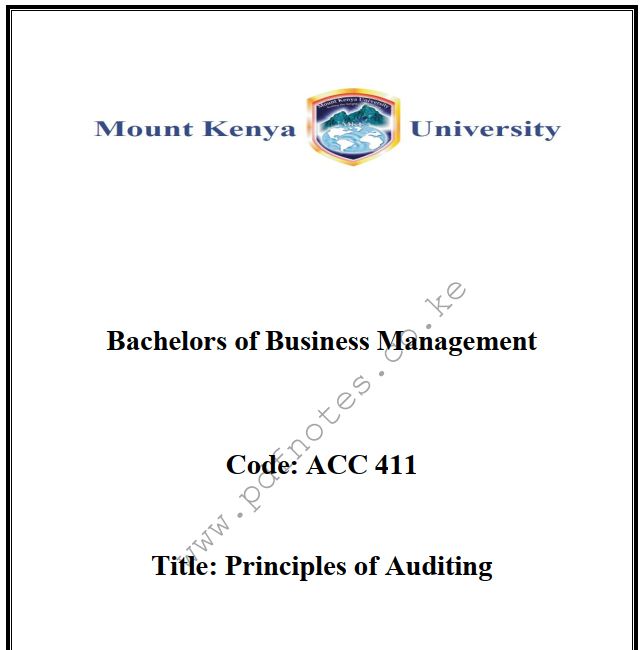
Chapter One – Introduction to Auditing
- Introduction
- Agency Theory and Auditing
- Agency Relationship between Shareholders and The Management
- Conflict between Shareholders and the Management
- Agency Relationship between shareholders and Creditors
- Conflict between Shareholders and the Creditors
- Users of Financial Statements
- The Purpose of Audit
- Objectives of Auditing
- The Auditor and Other Services
- Qualities of an Auditor
- Advantages and Disadvantages of Auditing
- Advantages of an Audit
- Disadvantages of an Auditor
- Review Questions
Chapter Two – The Auditor and the Companies Act Cap
- Introduction
- Auditors’ Appointment and Remuneration
- Resolution Relating to Appointment and Removal of Auditors
- Disqualifications for Appointment as Auditor
- Right of Access to Books and Attend Meeting
- Review Questions
Chapter Three – The Accounting Records and the Companies Act
- Introduction
- Books of Accounts and Audit
- Income Statement and Statement of Financial Position
- General Provisions to Contents and Form of Financial Statements
- Obligation to lay group accounts before holding company
- Form of group accounts
- Contents of group accounts
- Financial year of holding company and subsidiary
- Accounts and auditors’ Report to be Annexed to Balance Sheet
- Directors’ report to be attached to balance sheet
- Review Questions
Chapter Four – The Auditor and the Professional Ethics
- Introduction
- Profession
- General Rules of Ethics
- Independence
- Factors That Can Compromise The Auditor’s Independence
- Conflict of Interest
- Advertising
- Publicity
- Remuneration
- Insider Dealing
- Review Questions
Chapter Five – Engagement Letters
- Introduction
- Purpose of Engagement Letters
- Procedures
- Contents of an Engagement Letter
- Example of Engagement Letter
- Review Questions
Chapter Six – Accounting and Internal Control Systems
- Introduction
- Auditor’s Interest in Accounting System
- Management’s Interest in Accounting System
- Importance of Accounting Control System
- Internal Control System
- Types of Internal Controls
- Importance of Internal Controls
- Review Questions
Chapter Seven – Types of Audits
- Introduction
- Statutory Audits
- Private Audits
- Internal Audits
- Reliance on Internal Audits
- Management Audits
- Review Questions
Chapter Eight – Stages of Modern Audit
- Introduction
- Outline of Stages
- Background Research
- Audit Plan
- Review of Accounting System
- Review of Internal Control System
- Substantive Testing
- Analytical Review
- Preparation of Report
- Review Questions
Chapter Nine – Audit Evidence
- Introduction
- Types of Evidence
- Primary Evidence
- Supporting Evidence
- Circumstantial Evidence
- Techniques of Collecting Evidence
- Review Questions
Chapter Ten – Auditor’s Report
- Introduction
- Essential Requirements
- Content of the Auditors Reports
- Types of Auditors’ Reports
- Review Questions
Chapter Eleven – Auditing Computerized Systems
- Introduction
- Features of Computerized Systems
- Internal Controls in a Computerized System
- General Controls
- Application Controls
- Auditing In a Computer Environment
- Planning The Audit In A Computerized Environment
- Auditor’s Approach in Computerized Environment
- Auditing Around the Computer
- Auditing Through the Computer
- Computer Assisted Audited Techniques
- Audit Software
- Audit Software Use
- Test Data
- Review Questions
(Visited 83 times, 1 visits today)
